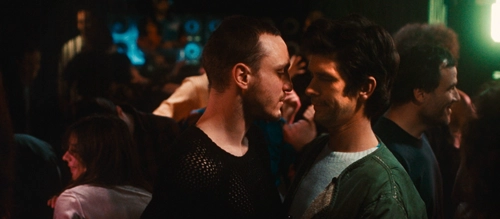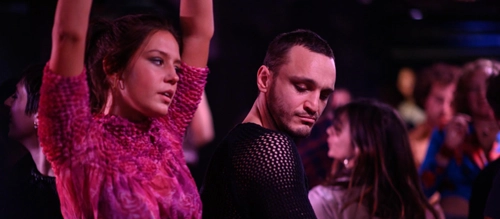Passages (2023) EIFF Review

Passages (2023)
Director: Ira Sachs
Screenwriter: Mauricio Zacharias, Ira Sachs
Starring: Franz Rogowski, Ben Whishaw, Adèle Exarchopoulos
First shown to the world at the 2023 Sundance Film Festival, the latest feature from Little Men (2016) and Frankie (2019) director Ira Sachs, Passages, has been one of the most anticipated releases of 2023. Having received its UK premiere at the 76th edition of the Edinburgh International Film Festival (EIFF), British cinemagoers are now a little closer to discovering the film for themselves.
Following a male couple, Tomas (Franz Rogowski) and Martin (Ben Whishaw), and their tumultuous relationship after Tomas has an affair with a woman, Agathe (Adèle Exarchopoulos), Passages focuses on the dynamic between the trio as they try to navigate the difficult situation they find themselves in.
Sachs begins with an extended opening in which we see Tomas directing his latest feature film (cheekily titled Passages). Though the scene is only a few minutes long, it works effectively to set up the character who will be our protagonist for the next ninety minutes or so: he likes to be in control. We watch him direct the scene down to the most minute detail, from the way in which someone walks down the stairs to the way an extra is holding their glass. Despite his clear desire to be in control of everything in his life, it is evident that what he wants and why he wants it is a little less explicit.
It is within this idea that the film primarily plays out. There is less of a traditional narrative and more a series of events which impact the lives of the characters on the screen.
Franz Rogowski’s lead character Tomas is a difficult one to engage with. His reasoning is never apparent and he can be tough to watch due to his troubling behaviour and ugly personality. Sachs attempts to combat this by shooting a large portion of the film from behind. Specifically, scenes in which Tomas is confronted for his actions are usually shot in such a way that we cannot see Tomas’ face in frame. This provides a unique experience that allows us to come to our own conclusions based purely on body language, and highlights Sachs’ excellent use of blocking.
Through actions like this it is clear that Ira Sachs has a vision for how he wishes to portray his story visually. However, as far as the writing goes, it creates a lead character whose inscrutable actions make him difficult to enjoy. We see him have several affairs and treat those partners with such little regard that we struggle to understand what they ever saw in him in the first place, nor why he is even bothering to make these horrible decisions given his clear indifference to the people he claims to love. This creates a domino effect in that we then find it hard to believe that anyone would stick around, including ourselves.

It is unfortunate given that the entire cast offer wonderful performances. As terrible as Tomas may seem, Franz Rogowski brings a strong performance to the table. He is perhaps not as charismatic or as charming as some have suggested, but Rogowski accurately crafts a truly bad person in many of his actions and reactions, exuding a regret that his character must face consequences for his actions as oppose to regret towards the actions themselves.
Ben Whishaw is good, too. He brings a softness to the role, oozing kindness even in the most devastating of moments. As the voice of Paddington Bear, it is fair to say that Whishaw brings this to every role. In Passages, this portrayal helps us to understand why his character would want to stay with such a despicable character like Tomas, though admittedly he is fighting an uphill battle given the impenetrable nature of the script.
Whishaw and Exarchopoulos do have a spark between them, though we only ever see this mutual respect play out a few times which leaves a lot left to be desired. Rogowski, in contrast, seems absent of any connection to his two apparent lovers, and it is this that becomes Passages’ biggest issue.
Just as we fail to believe why anyone would ever stay around someone like Tomas due to his actions, the lack of any spark between Rogowski and his co-stars makes matters worse; we simply don’t understand what they saw in him in the first place. There are multiple moments in which there are extended, lengthy sex scenes, and though the lust is clearly there, the love never is. This works well for Tomas, though we never even feel the one-sided love that Martin or Agathe claim to have for him. Whereas the relationships between the three should be the backbone of the film, it instead becomes Passages’ biggest problem.
Ira Sachs’ Passages is a disappointing release. It crafts an interesting tale that could exhibit some great performances and fascinating character work, but it executes such promising material with little intrigue. Though the film is performing well with critics and is providing Western cinema with the more adult pictures that it so desperately craves, Passages ultimately fails to arouse.
Score: 10/24

